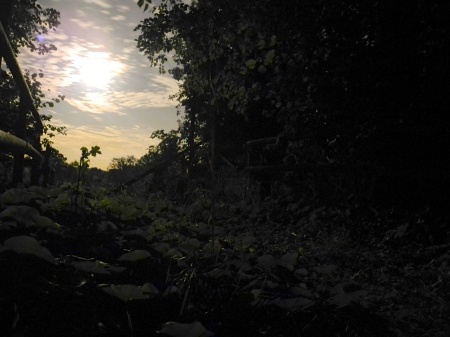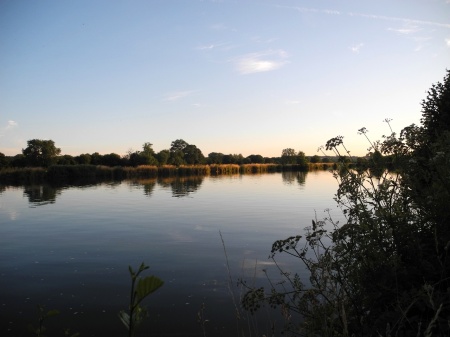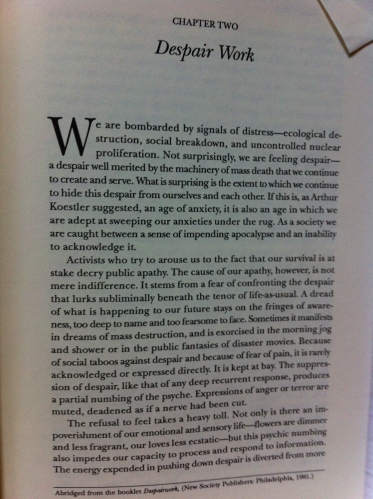This is a blog about strong emotions and how these impact our actions. I was inspired to write it by my encounter with ecopsychologist, Buddhist scholar and activist Joanna Macy – a woman who has pioneered working with despair since the 1970s. Despair in this blog will refer to a combination of feelings including grief, anger, powerlessness and fear.
It is not surprising for me that despair is so common to people in my periphery. Those attempting to confront injustices are fighting an uphill battle in this political context. Meanwhile, we witness with horror the ineffectiveness of our work as disaster capitalism continues to be so reckless with the climate, the rest of the environment and the wellbeing of the vast majority.
Despair is practically endemic amongst those who make time to notice poverty in an age of plenty, unnecessary wars, climate change, unprecedented species extinctions, the state of the oceans, forests, fresh water – amongst a plethora of other crises. The next problem then becomes how we cope with this information. Considering despair in all its various manifestations – how can we keep it from being debilitating?
One of the worst things despair can do is to destroy our capacity to organise collectively. The most important work we have before us requires reaffirming commonalities, acknowledging our inter-dependency with each other (and the Earth) and acting in solidarity to address the causes of crises. Despair threatens this work by provoking denial and creating a space for anger to fester – ultimately creating even greater social atomisation. I will discuss the problems of denial and anger briefly before I describe how Joanna Macy’s work helps us respond to despair.
Denial
Despair can be understood as the flip side of denial. The despair we feel facing social and ecological circumstances can be blunted by denial but this only creates a host of other problems, not the least of which is the weakening of an impulse to act. Denial functions as a kind of (false) self-preservation instinct, a means of avoiding disturbing information by filtering out content that makes us feel uncomfortable. Denial of the extent of the crises in the natural world and also our capacities to do something about these problems enables individuals to proceed with business as usual.
Denial is a central problem in environmental communication and education. Typically new information that threats our self-image, worldview and/or mental stability is rejected. When individuals are presented with information that suggests our lifestyles and economic system are a cause of climate change and other severe ecological problems, this information causes uncomfortable emotional tension – including the threat of despair. This dynamic is known as cognitive dissonance.
Thus disturbing information is often denied. Denial is a strategy used, mostly subconsciously, to avoid the despair that accompanies acknowledging the ecological destruction and social crises that are a result of the ways in which we all live and how our economic system is organised. I have written about denial on my blog here – here and here.

While many people avoid (deny) disturbing information, some of us refuse or are unable to do this ignoring. The fact that so many people still deny the implications of climate change and other ecological crises makes the work of activists exponentially more difficult. We constantly rub up against those obstructing the kinds of change that will need to occur for adequate responses to environmental threats to become possible. Joanna Macy’s work addresses these emotional tensions. The results are increased capacities to both acknowledge and address the causes of our collective problems.
Anger
For many of us anger is a huge part of despair. How can we not feel angry when we watch individuals, social institutions and governments tactically ignore crisis conditions and refuse to address social injustices and ecological problems? Love for destroyed people and places fuels the rage. This anger can be the fuel that drives us to act. What happens as a result of this anger is a primary concern. All too often this anger is channelled in what ways that appear to me to be extraordinarily destructive.

Since those who are responsible for injustices are inaccessible – the nearest available target often takes the hit. Racists are the most extreme (and most despicable) of all those who project their hatred onto groups and individuals that have nothing to do with the cause of their frustration. Yet this problem has more subtle manifestations. Those who are familiar with my blog will know that I have been writing about the ‘fascist turn’ within social movements.
Anger has a way of making people jump to conclusions, unable/unwilling to listen to other points of view and quick to launch personal attacks. It is strategically disastrous for angry attacks on individuals to be so acceptable as they are today in public debate, especially social movements (which should be considered spaces where people learn from each other). Most people will not engage in a scene where they risk being attacked for voicing the wrong opinion, or not using the necessary vocabulary to express this opinion. Movements are stunted just when they are most badly needed.
Part of my own despair over the past few years has to do with what I feel is the unravelling of capacities for solidarity largely due to anger that has been allowed to fester, flare up and extinguish possibilities for people with very similar politics to see common ground. This has been most pronounced in feminist debates and the Occupy movement. The bitterness of the debates within feminism have been most tragic. Feminism for me was always about an ethic of care – for women and men, and to apply the lessons we learned from fighting patriarchy to fighting for other types of social and environmental justice. We have better ways of dealing with things to offer.

Despair and Empowerment
This is the context in which I turned to despair work developed by 84-year old eco-psychologist, activist and Buddhist scholar Joanna Macy. Joanna has been doing despair work with activists, heavily impacted communities and regular folks for nearly four decades. I was extraordinarily lucky to be able to attend a several day workshop with Joanna earlier this year. It’s important to note that this is not work to move beyond despair. It is about enabling individuals to learn to live with despair (as a consequence of confronting injustice and rampant ecological destruction) while developing or strengthening capacities to take action.
Joanna Macy explained that when she started to do this work she considered it about helping activists become more effective. She later discovered that her work was needed as a means of helping everyone cope with the emotional stress resulting from social pressures of living in a society facing social and ecological meltdown. If we have nothing to do with our despair but keep it bottled up, it drains our vitality. If we can manage to share it, we not only find communality with other people’s experiences but despair can become a source of both personal empowerment and politicization.
Page from World as Lover, World as Self by Joanna Macy 2007
Joanna’s main focus in activism has been anti-nuclear movement. She brings her despair work to front line communities in contaminated sites. The stories from her work in villages around Chernobyl most powerfully demonstrate the relevance of this practice. Ecological crises quickly turns into social crises as people deal with the consequences of industrial pollution: disease spreads through communities.
Joanna Macy’s workshop runs through four steps based on a mixture of practices and beliefs including engaged Buddhism, ecopsychology and systems thinking. I will not write in detail about exactly what we did, as it really is something to be experienced. I hope to make this possible for more people and I ran a trial run the next weekend with eight friends. The pictures in this blog are from this week. Confronting despair, naming it and sharing experiences is a powerful process and is a means of addressing the twin problems of denial and anger as obstacles to solidarity in movements for social change.
Many thanks to Zulema Lily for the photographs.








I find your post on America’s difficulty in grappling with despair and denial regarding ecological and social crises to be very interesting. I agree that as a population, the worst thing to do is deny to negative global and social changes we have caused. As people we must confront the damage we have done, and not feel anger, but unite and become aware of our interdependencies as you say, and work to create change. I agree with what you said about anger having the ability to be a dangerous source of fuel for reform.
Pingback: SOCIAL MOVEMENT: rising above despair | BGS 8- Thursday Section
For two years now, ever since the Newtown killings, I have given in to despair and anger. I seem to be paralyzed, even after spending most of my adult life as an environmental activist. (I am now 68). This state of immobility shocks me, yet I can only sit here in my library reading Macy and others trying to get the energy to get up and move. I can see that unforgiveness is part of the problem; unforgiveness of myself and anger towards Congress, racists, polluters, uninvolved churches and deniers all around. Shame haunts me because of this and only and makes the paralysis even deeper.
Thank you Steve for your comment. I am glad Macy and others are a solace to you during this time. Obviously you know that you are not alone with grief of this nature. If possible, you might want to try to find (or make) a group where these ideas can be shared. Unless your are the CEO of Monsanto or Exxon (or a banker who finances them) you must not carry the shame for what is happening in this world! (I say this in jest but I think we should also try to forgive them in their ignorance if they could become willing to move forward). I have immense gratitude towards everyone who done the hard work of environmental activism and hope this moment of despair passes for you. Good luck with your journey.